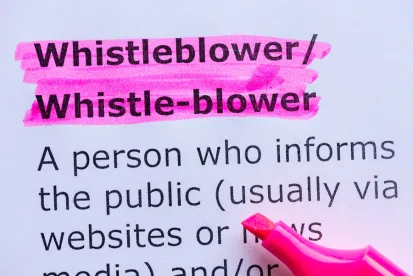Former President Trump signed into law the Criminal Antitrust Anti-Retaliation Act of 2019 on December 23, 2020. The law prohibits employers from retaliating against employees who provide information to a superior, to a federal enforcement agency or to Congress regarding a potential criminal violation of the antitrust laws. Congress passed the Act to protect antitrust whistleblowers and encourage them to report suspected antitrust violations.
The law provides that “[n]o employer may discharge, demote, suspend, threaten, harass, or in any other manner discriminate against a covered individual” if the individual “provide[s] or cause[s] to provide to the Federal Government or a person with supervisory authority over the covered individual . . . information relating to any violation of, or any act or omission the covered individual reasonably believes to be a violation of [] the antitrust laws . . . .” The law includes in its definition of “covered individuals” employees, contractors, subcontractors and agents of the employer.
This is the first federal statute to afford whistleblower protections to private employees who report on or assist in the investigation or prosecution of criminal antitrust violations. Notably, these protections do not extend to individuals, who would otherwise qualify as “covered individuals,” “who engage in the underlying criminal conduct or who obstruct or attempt to obstruct an antitrust investigation.” In addition, these protections do not apply to covered individuals reporting noncriminal antitrust violations (e.g., exclusive dealing and price discrimination).
If a covered individual is terminated or faces other adverse personnel actions because of their whistleblowing, the law provides for administrative remedies. Within 180 days of the retaliatory action, the individual must file a complaint with the Department of Labor (DOL). Before the DOL issues its preliminary order, the employer named in the complaint will be given an opportunity to respond in writing, meet with a designated DOL representative and present witnesses. After investigation, the DOL will issue its findings and preliminary order; and within 30 days, either party can file objections and request a full administrative hearing. The final order that issues from the DOL after the hearing can then be appealed to the U.S. Court of Appeals for the circuit in which the violation allegedly occurred. The reviewing appellate court will give substantial deference to the DOL’s factual findings and set aside the DOL’s final order only if it is “arbitrary, capricious, an abuse of discretion, or otherwise not in accordance with law.”
The relevant legal standard applied in these whistleblower cases is whether there is “reasonable cause to believe that the complaint has merit,” meaning the employee’s conduct with respect to reporting an alleged criminal antitrust violation, or assisting in a related investigation or prosecution, is at least a “contributing factor in the unfavorable personnel action alleged in the complaint.” The “contributing factor” standard is intended to be “broad and forgiving” and “was intended to overrule existing case law, which require[d] a whistleblower to prove that his protected conduct was a ‘significant,’ ‘motivating,’ ‘substantial,’ or ‘predominant’ factor in a personnel action in order to overturn that action.” See, e.g., Lockheed Martin Corp. v. Admin. Review Bd., U.S. Dep’t of Labor, 717 F.3d 1121, 1136 (10th Cir.2013) (a “contributing factor” is “any factor, which alone or in combination with other factors, tends to affect in any way the outcome of the decision”).
The DOL is not permitted to order relief for the employee where the employer “demonstrates by clear and convincing evidence that the employer would have taken the same unfavorable personnel action in the absence of that behavior.” In the case of a frivolous complaint, the DOL has the authority to award the prevailing employer its reasonable attorneys’ fees up to $1,000.
The Act complements other federal efforts to encourage corporate antitrust compliance and reporting. Since 1993, the Department of Justice Antitrust Division’s (DOJ) corporate leniency program has incentivized companies and individuals to self-report criminal antitrust violations in exchange for immunity from criminal prosecution, fines and, in the case of individual bad actors, prison sentences. And in June 2020, former President Trump signed the Antitrust Criminal Penalty Enhancement and Reform Permanent Extension Act, which provides for detrebling of damages in civil antitrust lawsuits (the federal antitrust laws typically provide for damages equal to three times the damages attributable to the unlawful conduct) in exchange for cooperation in both the criminal and civil antitrust actions resulting from unlawful anticompetitive conduct.
The DOJ has applauded the passage of the Act, noting that the Act will “incentiviz[e] disclosures of anticompetitive conduct” and “strengthen the Antitrust Division’s criminal enforcement program.” The Act will supplement other recent initiatives by the DOJ designed to detect, investigate and prosecute criminal antitrust violations, including the Procurement Collusion Strike Force, which targets antitrust violations in government procurement, and the DOJ’s revised guidelines on corporate compliance programs, which encourage prosecutors to take an individualized approach when assessing the reasonableness and effectiveness of companies’ antitrust compliance efforts.
The antitrust laws are nuanced and complex, and their application to specific circumstances involves a fact-intensive inquiry. Questions regarding how the Criminal Antitrust Anti-Retaliation Act of 2019 will affect the rights and obligations of employers and their employees should be directed to antitrust counsel.







 />i
/>i

